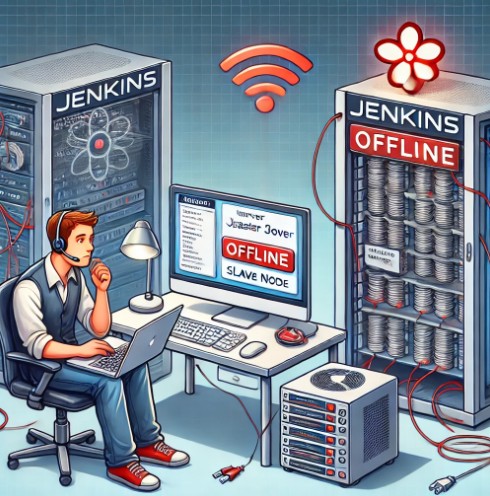Table of Contents
- 1 Introduction
- 2 What Is a Jenkins Slave Agent?
- 3 Common Causes of Jenkins Agent Offline
- 4 Basic Troubleshooting for Jenkins Slave Agent Offline
- 5 Advanced Troubleshooting for Jenkins Slave Agent Offline
- 6 Best Practices to Prevent Jenkins Agent Offline Issues
- 7 Frequently Asked Questions (FAQs)
- 8 Conclusion
Introduction
As a staple in the Continuous Integration and Continuous Deployment (CI/CD) ecosystem, Jenkins is known for its ability to automate development workflows. Jenkins relies on a master-agent architecture to distribute workload across multiple nodes. However, one common issue that disrupts this flow is the Jenkins slave offline error. When this occurs, jobs scheduled for an offline agent remain stuck, halting your automation pipeline and affecting overall productivity.
In this in-depth guide, we’ll cover everything from the fundamental causes of this problem to advanced troubleshooting strategies. By the end, you’ll be equipped to resolve Jenkins slave agent offline issues with confidence and keep your pipelines moving without disruption.
What Is a Jenkins Slave Agent?
Before diving into troubleshooting, let’s clarify what a Jenkins slave agent is and its role within Jenkins. In Jenkins terminology, a slave (also known as a node or agent) is a machine that performs the execution of builds. The Jenkins master delegates tasks to the slave agents, which then execute the assigned jobs.
When the Jenkins agent goes offline, it means that communication between the Jenkins master and the slave has been interrupted, either due to network, configuration, or resource issues.
Common Causes of Jenkins Agent Offline
Identifying the root cause is key to efficiently resolving the Jenkins slave agent offline issue. Below are the most common reasons this error occurs:
- Network Connectivity Issues
The most common reason for a Jenkins agent offline error is a network issue between the master and the agent. This could be due to:- Firewall restrictions
- DNS resolution problems
- Network instability
- Insufficient Resources on the Slave Node
The agent may go offline if the node is low on CPU or memory resources. A high resource load can cause disconnections. - Incorrect Agent Configuration
Misconfigurations such as incorrect IP addresses, port settings, or labels can lead to communication failures. - Agent Authentication Failures
If the agent is not properly authenticated or if there are incorrect SSH keys or user credentials, Jenkins won’t be able to connect to the slave. - Timeouts in Communication
If the communication between master and agent is delayed, due to network latency or misconfigured timeouts, the agent may appear offline.
Basic Troubleshooting for Jenkins Slave Agent Offline
1. Verify Network Connectivity
Step 1: Ping the Slave Agent
The first troubleshooting step is to ensure the master can reach the agent over the network. Open the terminal on your Jenkins master and use the ping command to verify network connectivity.
ping <agent_IP_address>If you receive a timeout or no response, there may be a network issue.
Step 2: Check Firewall and DNS
- Firewall: Ensure that the ports used by Jenkins (default: 8080) are not blocked by firewalls.
- DNS: If you’re using hostnames rather than IP addresses, check that DNS resolution is working correctly.
Step 3: Test SSH Connection (If Applicable)
If the agent connects over SSH, ensure the master can SSH into the agent using the appropriate key.
ssh jenkins@<agent_IP_address>If SSH fails, you may need to regenerate SSH keys or reconfigure access.
2. Restart Jenkins Slave Agent
A simple restart can sometimes fix minor connectivity issues.
- Go to the Jenkins Dashboard.
- Navigate to the Manage Nodes section.
- Select the Offline Agent.
- Click on the “Launch Agent” button to reconnect.
If the agent doesn’t reconnect, try restarting Jenkins on both the master and agent systems.
3. Review Agent Configuration Settings
Step 1: Verify IP Address and Port
Incorrect IP addresses or ports in the agent configuration can cause the agent to appear offline. Navigate to Manage Jenkins > Manage Nodes and ensure that the correct IP address and port are being used for communication.
Step 2: Check Labels and Usage
If your jobs are configured to run on nodes with specific labels, ensure that the slave is correctly labeled. Mismatched labels can prevent jobs from running on the correct node, leading to confusion about agent status.
4. Check Agent Resources
An agent with insufficient resources (CPU, RAM, or disk space) can experience performance degradation or go offline.
Step 1: Monitor System Resources
Log into the agent machine and monitor the system’s resource usage with commands like top or htop:
topIf CPU or memory usage is high, consider scaling up the machine or reducing the workload on that agent.
Step 2: Free Up Resources
- Stop any unnecessary processes consuming high resources.
- Increase system resources (RAM or CPU) if possible.
Advanced Troubleshooting for Jenkins Slave Agent Offline
If the basic troubleshooting steps don’t resolve the issue, you’ll need to dig deeper into logs and system configurations.
5. Analyze Jenkins Logs
Both the Jenkins master and the agent generate logs that provide valuable insights into connectivity issues.
Step 1: Check Master Logs
On the Jenkins master, logs can be found at:
/var/log/jenkins/jenkins.logLook for error messages related to agent disconnection or failed build executions.
Step 2: Check Agent Logs
On the agent machine, check logs for connectivity or configuration errors:
/var/log/jenkins/jenkins-slave.logCommon log entries to look out for:
- Network timeouts
- Authentication failures
- Resource limitations
6. Address Authentication and Authorization Issues
Step 1: SSH Key Setup
Ensure that the SSH key used by the Jenkins master to connect to the slave is correctly configured. On the master, the public key should be stored in the .ssh/authorized_keys file on the agent machine.
cat ~/.ssh/id_rsa.pub | ssh user@agent 'cat >> .ssh/authorized_keys'Step 2: Reconfigure Jenkins Credentials
Go to Manage Jenkins > Manage Credentials and verify that the correct credentials (e.g., SSH username and private key) are configured for the agent.
7. Tweak Jenkins Timeout and Retry Settings
Sometimes, the Jenkins agent offline error is caused by network timeouts. Increasing the timeout settings on the Jenkins master can help in such cases.
Step 1: Configure Jenkins Timeouts
You can configure the SSH connection timeout in Jenkins by navigating to the agent’s configuration page and increasing the Launch Timeout under the Advanced Settings.
Step 2: Increase Agent Connection Retries
Configure the Retry Strategy to allow Jenkins to retry connecting to an offline agent before marking it as unavailable.
Best Practices to Prevent Jenkins Agent Offline Issues
To prevent future occurrences of the Jenkins agent offline issue, consider the following best practices:
8. Use Dockerized Jenkins Agents
Using Docker to spin up Jenkins agents dynamically can reduce agent downtime. Dockerized agents are isolated and can easily be restarted if an issue arises.
Step 1: Install Docker
Ensure Docker is installed on the slave machine:
sudo apt-get install docker-ce docker-ce-cli containerd.ioStep 2: Set Up Docker Agent
Create a Dockerfile for your Jenkins slave agent:
FROM jenkins/slave
USER root
RUN apt-get update && apt-get install -y gitRun the Docker container:
docker run -d -v /var/run/docker.sock:/var/run/docker.sock jenkins-agent9. Set Up Monitoring and Alerts
Monitoring your Jenkins agents and setting up alerts for when an agent goes offline can help you react quickly and minimize downtime.
Step 1: Integrate Monitoring Tools
Use monitoring tools like Nagios or Prometheus to keep track of agent availability and resource usage.
Step 2: Configure Email Alerts
Set up email notifications in Jenkins for when an agent goes offline. Go to Manage Jenkins > Configure System > E-mail Notification to set up SMTP configurations for alert emails.
Frequently Asked Questions (FAQs)
Q: Why does my Jenkins agent keep going offline?
A: This can be due to network issues, resource limitations, firewall settings, or incorrect agent configurations.
Q: How can I check if my agent is offline?
A: You can check the status of your agents by going to Manage Jenkins > Manage Nodes. Offline agents will be marked as such.
Q: What are the most common causes of the Jenkins agent offline issue?
A: The most common causes include network disconnection, insufficient resources on the agent, firewall blocking, and authentication issues.
Q: Can Docker help in managing Jenkins agents?
A: Yes, Docker allows you to easily create isolated agents, reducing downtime and simplifying the management of Jenkins nodes.

Conclusion
The Jenkins agent offline issue is common, but by following this deep guide, you can systematically troubleshoot and resolve the problem. From basic connectivity checks to advanced configuration tuning, each step is designed to help you bring your agents back online quickly. Furthermore, by implementing preventive measures like Dockerization and monitoring tools, you can ensure that your Jenkins environment remains stable and efficient for future workflows.
By following the steps outlined above, you will not only resolve Jenkins slave agent offline issues but also prevent them from recurring. Keep your CI/CD pipelines running smoothly, minimize downtime, and maintain an efficient development workflow with Jenkins. Thank you for reading the DevopsRoles page!

